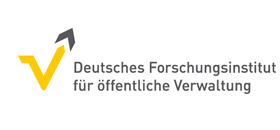Lehrstuhl für Öffentliches Recht, Staatslehre und Rechtsvergleichung (Univ.-Prof. Dr. Dr. h.c. Karl-Peter Sommermann)
Refine
Year of publication
Document Type
- Part of a Book (75)
- Article (69)
- Book (47)
- Public lecture (45)
- Conference Proceeding (29)
- Contribution to a Periodical (23)
- Review (15)
- Part of a commentary (8)
- Other (3)
- Lecture (2)
Language
- German (187)
- English (48)
- French (34)
- Spanish (31)
- Other Language (15)
- Multiple languages (3)
Is part of the Bibliography
- no (318)
Keywords
- Deutschland (3)
- Europa (3)
- Geschichte (3)
- Verwaltungsgerichtsbarkeit (3)
- Appalti, parere precontenzioso, Vergabekammern, rimedi giustiziali (1)
- Begriff (1)
- Direttive (1)
- EMRK (1)
- EU-Grundrechtecharta (1)
- Energie (1)
Institute
- Lehrstuhl für Öffentliches Recht, Staatslehre und Rechtsvergleichung (Univ.-Prof. Dr. Dr. h.c. Karl-Peter Sommermann) (318)
- Lehrstuhl für öffentliches Recht, insbesondere allgemeines und besonderes Verwaltungsrecht (Univ.-Prof. Dr. Jan Ziekow) (9)
- Lehrstuhl für Verwaltungswissenschaft und öffentliches Recht (Univ.-Prof. Dr. Hermann Hill) (5)
- Lehrstuhl für Öffentliches Recht, Finanz- und Steuerrecht (Univ.-Prof. Dr. Joachim Wieland) (3)
- Lehrstuhl für Öffentliches Recht, insbesondere deutsches und europäisches Verwaltungsrecht (Univ.-Prof. Dr. Ulrich Stelkens) (3)
- Lehrstuhl für Politikwissenschaft (Univ.-Prof. Dr. Stephan Grohs) (1)
- Lehrstuhl für Öffentliche Betriebswirtschaftslehre (Univ.-Prof. Dr. Holger Mühlenkamp) (1)
In der Zeit vom 28. bis 30. Oktober 1992 fand in Barcelona das vierte gemeinsame Seminar des Forschungsinstituts für öffentliche Verwaltung bei der Hochschule für Verwaltungswissenschaften Speyer mti der Escola d'Administració Pública de Catalunya statt. Grundlage der gemeinsamen Tagungen ist ein im Juni 1987 zwischen beiden Einrichtungen geschlossenes Kooperationsabkommen.
In diesem Jahr lag es nahe, die Tagung den durch die deutsche Vereinigung ausgelösten grundlegenden Gesetzesreformvorhaben in der Bundesrepublik zu widmen. Dazu zählen die Maßnahmen zur Beschleunigung der Verkehrswegeplanung ebenso wie die Beratungen zur Änderung des Grundgesetzes udn die Verfassunggebung in den neuen Ländern.
Erstaunlicherweise ist über die „Tragweite" von Grundrechten bis heute recht
wenig geschrieben worden. Der Begriff wird in Art. 52 Abs. 3 der EU-Grundrechtecharta verwendet und verweist auf einen Bestandteil der Rechte aus der Europaischen
Menschenrechtskonvention, die von der Charta ubemommen
wurden. Seine Verwendung in diesem Zusammenhang bietet Anlass fur Überlegungen
über die Stellung der Grundrechte im Unionsrecht, welche mit dem Lissabonner
Vertrag und vor allem der Grundrechtecharta eine neue Dimension erhalten haben
dürfte.
In the field of public procurement EU law has deeply regulated not only the awarding procedures of public contracts of works, supplies or services (and since 2014 of concession contracts) but also the related review mechanisms. EU directives allow member states to decide upon the identification of the “bodies responsible for review procedures” (breviter “review bodies”) in charge of determining a possible breach of public procurement directives and whether such review bodies should or should not be judicial in character.
The essay focuses on the comparison between the implementation given to those rules by the German law, especially regarding the Vergabekammern (“Public procurement tribunals”), which are non-judicial review bodies in charge of first instance decisions, and by Italian law, where the new pre-litigation advice of ANAC (i.e. Italian Anti-Corruption Authority) has been introduced since 2016, in addition to the traditional judicial remedies, as an optional and ancillary non-judicial remedy.
In the judgment of 24 June 2019, Commission v. Poland (Independence of the Supreme Court), C-619/18, EU:C:2019:531, the Court of Justice of the European Union ruled on the retirement of Polish Supreme Court judges, declaring that the mechanism of arbitrary lowering the retirement age was not compatible with the European Union law. This commentary analyses the latest changes in the Polish judicial system and the CJEU's arguments. The study is focused in the change in European case-law and the development of instruments available to the EU institutions for monitoring judicial independence. The paper discusses also the elements of the judicial independence indicated by CJEU and the rules on the retirement of judges.
The article presents legal (constitutional) aspects of the emergency situation concerning the first wave of the Covid-19 pandemic.
In the case, Brzeziński v. Poland, the European Court of Human Rights for the third time addressed the issue of the summary electoral proceedings in the Polish legal system. The last judgement is an excellent opportunity to examine if the provisions of the electoral law concerning these proceedings are well designed and correctly interpreted by the Polish courts. There is no doubt that free elections and freedom of expression together form the bedrock of any democratic system. The two rights are inter-related and operate to reinforce each other. For this reason, it is particularly important in the period preceding an election that opinions and information of all kinds are permitted to circulate freely. On the other hand, national authorities are legitimised to create special proceedings in order to ensure the proper conduct of the electoral campaign by preventing the dissemination of false information. As a consequence, it is possible to verify factual statements contained in the materials pertaining to an electoral campaign. Special proceedings should not apply to the value judgements. If such comments and opinions infringe the candidate’s personal rights, he or she may seek redress under the general rules of protection of individual rights.
The purpose of this article is the general vision of judicial independence in the EU and its defence mechanisms. The article analyses the ways of the protection of this principle, as well as its development and substantial content in the context of the recent CJEU jurisprudence on the status of the judiciary in Poland. The first part of the article explains the techniques (of a political and legal nature) to guarantee judicial independence in the EU. The objective is to demonstrate how the procedure based on the Article 7 TEU, as well as the preliminary rulings (Article 267 TFEU) and infringement procedures (Article 258 TFEU) increment the enforceability of judicial independence. In the second part the article develops the concept of judicial independence and the detailed guarantees in this field, including rules for judicial appointments, the retirement regime, disciplinary responsibility and remuneration.

